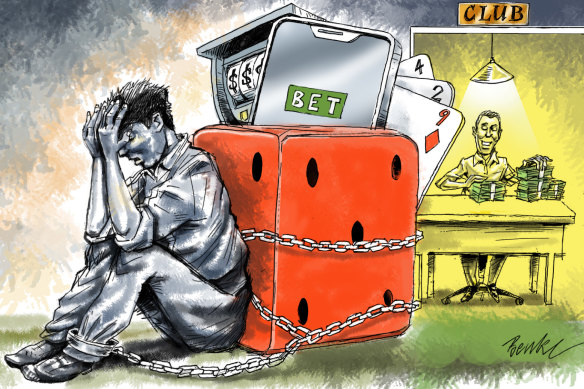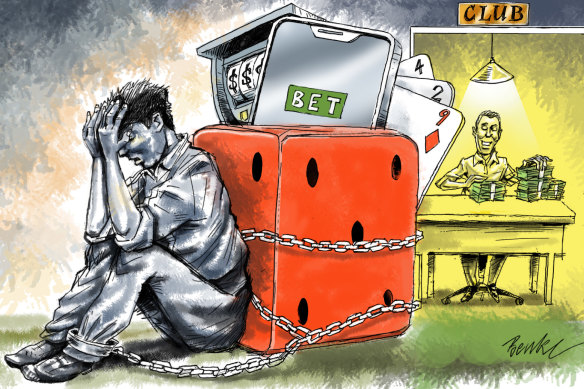I grew up in a strict, Salvation Army household where there was no drinking, smoking or gambling. My parents wore their uniforms everywhere they went. Women wore no makeup or jewellery. Young boys like me weren’t allowed to go to the pictures.
My parents were strict, but loving. I had no problem with any of this except the ban on movies. We kids played cards, but not with ordinary playing cards. Why not? Because people might think we were gambling. So we played Snap, and Happy Families, with cards depicting Mr Bun the baker and his family.

The proportion of online gamblers seeking support has surged in recent years.
After I left home I gave up these old-fashioned strictures. But they left me convinced of the damage that addiction to alcohol and gambling can do to people and, especially, their families, often deprived of enough money to live on.
So when the last act of the late Peta Murphy, a Victorian federal MP, was a parliamentary inquiry calling for greater control over the modern scourge of online betting, I was happy to join the cause. It’s way past time we stopped allowing businesses and even the members of licensed clubs to benefit from the harm done to addicts and their families.
As the Grattan Institute and its chief executive Aruna Sathanapally reminded us in last week’s report, Australia has a gambling problem unmatched by other, more sensible rich countries. Our annual gambling losses exceed $1600 per adult. That’s twice what people lose in America or Britain, and almost three times what our Kiwi cousins shell out.

Illustration by Jozsef Benke
Why are our gambling losses so much greater? Not because of the romantic delusion that Aussies would gamble on “two flies crawling up a wall”, but because our governments have done less than others to protect us from people who just want to make a buck at our expense.
Grattan tells us that, in total, Australians lose about $24 billion a year on gambling. Half of this comes from poker machines and another quarter from betting on sport and racing. Lotteries, scratchies and casinos make up the rest.
By far the most addictive are pokies and fast-growing online betting, so these are the ones to worry about. When it comes to politicians failing to protect us from having our susceptibilities exploited, successive NSW governments take the cake.
They were the first to let licensed clubs become addicted to revenue from pokies, then let hotels have them too. But eventually, the malady spread to other states. NSW has 14 pokies per 1000 adults, ahead of Queensland on 11.
More sensible Victoria has just six machines per 1000 adults, but Western Australians manage to live normal, happy lives with just 0.7 per 1000. Poker machines were once called “one-armed bandits”. Now they’re just bandits. Although Australia has only about 0.3 per cent of the world’s population, it has 18 per cent of the world’s pokies. NSW accounts for about half of that.
As for online betting, its ubiquitous ads make it the most noticeable. It’s a safe bet it will grow to be a bigger problem than today. But so far, it’s of little interest to women, with young adult men by far the most susceptible.
Now, the vast majority of people who gamble do so in moderation, and do themselves no harm. But a small minority of pokie players and online betters become addicted. Grattan quotes data from debit card use showing that 5 per cent of gamblers account for 77 per cent of the spending.
That’s what makes pokies and betting so exploitative. Addiction can harm people’s financial security, health and broader wellbeing. Addicts can lose their jobs, smash their marriages, commit family violence, engage in fraud, be declared bankrupt and take their own lives.
I’m unforgiving of business people and club members who want to benefit from gambling – and politicians who lack the courage to hold them back – while turning a blind eye to all the human suffering gambling causes.
Grattan wants the feds to ban all gambling advertising and inducements, while state governments reduce the number of pokies over time.
It wants the feds to establish a national, mandatory “pre-commitment system” for all online gambling. Each state should introduce a similar pre-commitment scheme for pokies.
Pre-commitment schemes were invented by behavioural economists to allow us, in our more sensible moments, to impose limits on our own behaviour when we’re acting in the heat of the moment.
Grattan wants such commitments to be compulsory for all people that start using clubs, pubs or online betting sites after the scheme starts. You choose the limits you want to set on your spending per day, per month and per year. You can lower those limits any time you wish, but can raise them only after a delay of at least a day. The scheme would also impose maximum limits of say, $100 a day, $500 a month and $5000 a year.
Most gamblers would be unaffected by this scheme, but for others it would stop them ruining their lives. The clubs and pubs and big online betting companies will tell us it would destroy the economy. Don’t believe them.
Ross Gittins is the economics editor.
Ross Gittins unpacks the economy in an exclusive subscriber-only newsletter. Sign up to receive it every Tuesday evening.
